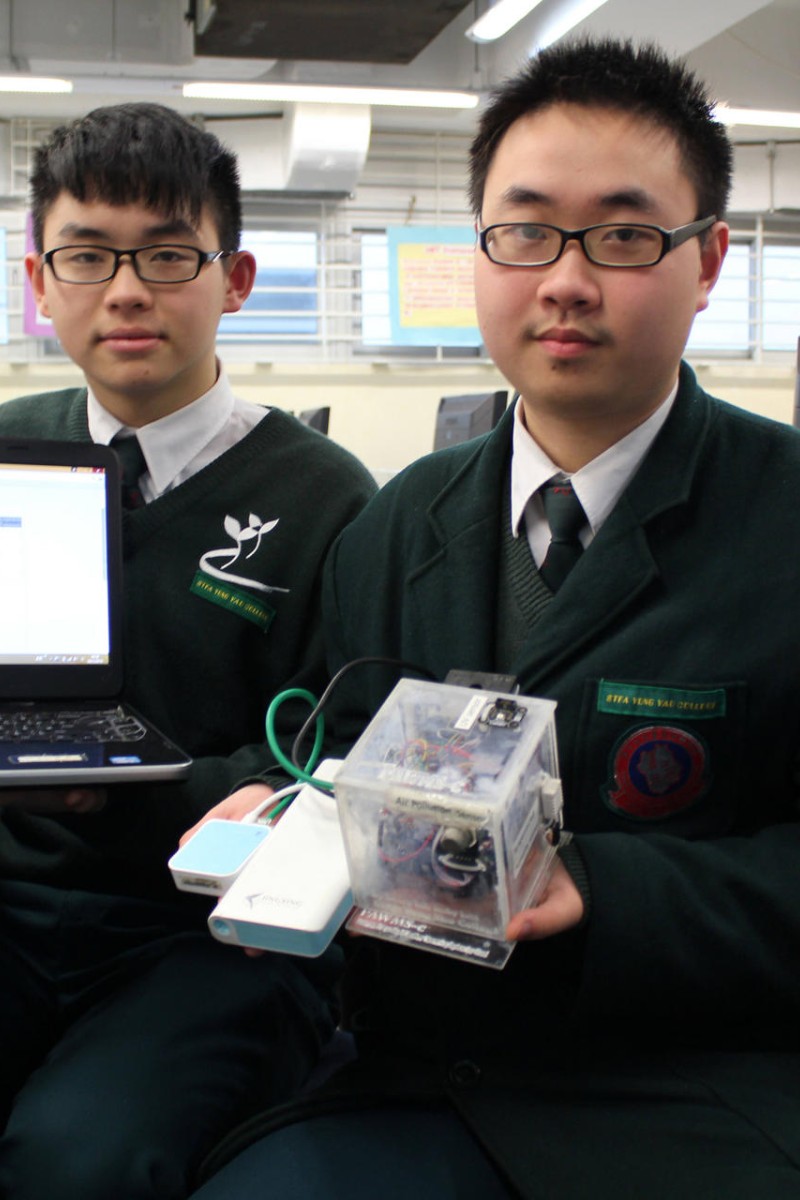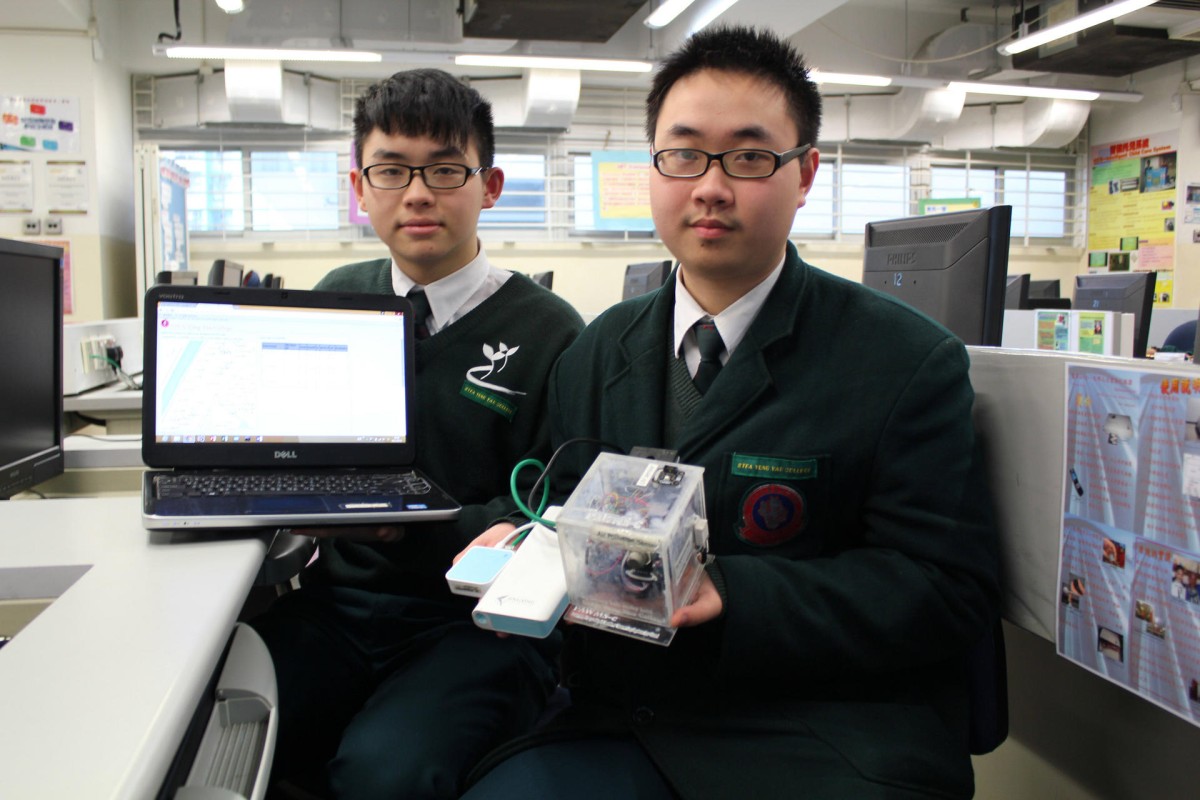
HK students invent medical technology to help patients with chronic illnesses
Far from eccentric old guys in dusty lab coats, these Hong Kong inventors are paving the way with new medical gadgets
 Jacky Lam (far left) and Benny Lai present their PAWMS-c showing the weather and air quality data.
Jacky Lam (far left) and Benny Lai present their PAWMS-c showing the weather and air quality data.Perhaps the world's most famous inventor is Thomas Edison, who was responsible for the electric light bulb and the motion picture camera more than 100 years ago.
More recently - and more locally - Hong Kong scientist Chan Yik-hei invented his security robot Total Equip and was rewarded with an asteroid named after him - 20780 Chanyikhei.
Instead of thinking outside the box, most young people in the city are too busy trying to cram in enough knowledge to pass an exam.
But complicated scientific experiments take a lot of time, energy and money, and distract students from the knowledge they could instead be getting from a textbook.
So where do modern inventors find the time to be innovative?
It all starts with a needy cause, as students at Shun Tak Fraternal Association Yung Yau College in Tin Shui Wai will tell you. These young brainiacs have dreamt up and designed two new gadgets to help those with medical conditions.
Portable Air-quality & Weather Measuring System for Cloud
Form Five student Benny Lai Siu-wai decided to focus his inventive skills on helping people with asthma, a breathing condition that has long troubled his father.
He wanted to invent a system that would provide his father with up-to-date and accurate air quality data.
Benny and his schoolmate Jacky Lam Chun-kit created a "small observatory" called Portable Air-quality & Weather Measuring System for Cloud (PAWMS-c). Compared to the Hong Kong Observatory, which only offers information about districts, the "small observatory" can measure the temperature, humidity, UV index, PM2.5 levels and air pollution index of a specific area.
"I hope my discovery will help alert my father and other people to places where the air quality is harmful. Having the other information is useful, too, as the weather can be unpredictable," says Benny.
The PAWMS-c is environmentally friendly, as its energy supply comes from solar energy. It's also connected to Google Maps and uses Google Cloud to store data.
Jacky says learning to code was the hardest part of their project. "Computer lessons only tell you basic computer knowledge, but we needed to master advanced programming techniques before applying them to our invention," he says. "We thought 'What's the point of learning these time-consuming skills?' Looking at our invention now, I think our efforts paid off." They say their invention is a boost for students from the remote district of Tin Shui Wai.
"Students in this district are usually labelled as second-class or marginalised students. Our invention has improved their image and shows we can compete with elite school or university students," Benny says.
Their invention is now internationally and locally recognised after they won a silver medal at last year's International Sustainable World (Energy, Engineering & Environment) Project Olympiad in Houston, in the US, as well as the Best Student Invention Grand Award at the Hong Kong ICT Awards in 2014.
But they're not resting on their laurels. Their next dream is to install more sensors which measure other data like rainfall or wind speed. Really, they've only scratched the surface of their potential.
Mind FootPrint
People with chronic illnesses can see their condition worsen quickly. If help arrives too late, they may even die. It's often a great burden for families and carers to look after a sick patient, especially when they don't have medical training.
Jack Wong Chung-pak's Mind FootPrint (MFP) could be a solution. The brainwave monitoring and health analysing system tracks the status of chronically ill patients.
MFP comprises a hat (brainwave detector), a smartphone app, a server programme and an interactive website.
The hat can identify seven states, including normal, faint, coma, hyper, ultra-hyper, weak life sign and death. The smartphone app tracks these states and sends a message to family members or doctors if the status becomes critical.
MFP uses GPS satellite tracking to show where users are, and the data is stored on Google Cloud for doctors to examine.
"I hope that my idea will prevent accidents and people having to suffer losing their loved ones to chronic illnesses," says Jack. "I also hope it'll mean users can enjoy normal activities, like shopping or eating out, without having to worry about their illness."
Last year, Jack was the first local student to win the President of the China Association for Science and Technology Award at the China Adolescents Science and Technology Innovation Contest - which only honours three winners each year.
He also won silver at InfoMatrix 2015 - a technology innovation competition in Romania. Let's hope he has a spacious awards cabinet - we're sure the best is yet to come.
